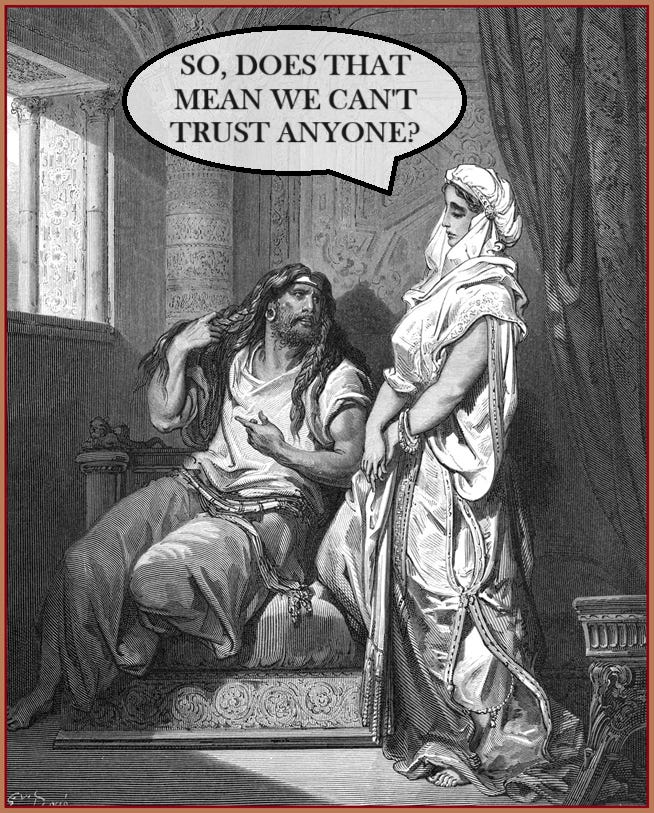OK, so you want to do your part.
But you also know (according to the beraita brought in Sanhedrin 97a) that Mashiach will not come until the land is filled with malshinim.
So how much do you risk?
And how much can you do?
Or tell?
And how can you even plan, when you know that the Erev Rav is electronically monitoring your every move and correspondence?
Is jailtime even an option? After all, you’ve got a family. A business. A job.
What’s a good Jew to do?
Shimshon HaGibor
Until such time as TzaHaL is on their way OUT of Yehuda and Shomron, and the State of Israel is headed toward its next, intermediate stage of disintegration, it will be difficult to execute any medium- to large-scale action against the enemy.
So…
What’s wrong with small-scale?
Why the need to be a bigshot?
…ונפשי כעפר לכל תהיה
There’s still plenty to be done by good Jews who are willing to think things through and act independently.
And by independently, we mean: telling no one. Not your wife. Not your brother. Not an old army buddy. And certainly not your shrink.
The model for such action, of course, comes from Shimshon HaGibor, via the book of Judges, chapt. 13.
There, it’s written that Shimshon “will begin to save the nation from the Philistines.”
He didn’t finish the job, to be sure—in fact, the Philistines are the single biggest and most persistent problem the Jewish nation faces throughout TaNaCh.
But he does get the ball rolling.
How?
By acting alone and saying nothing.
By being inventive and deadly serious in intent.
By loving the nation despite their often open disdain for him.
The Metzudat David explains (Judges 13:5) that Shimshon didn’t fight like the other judges, who finished the job when they went to battle. Shimshon always held back and retreated after delivering his blows.
That said, the other judges had armies to help them with the fighting.
Shimshon didn’t.
So, it appears he had little choice but to battle as he did.
In parashat Vayechi (Bereshit 49:16-18), when Yaakov blesses shevet Dan, Rashi explains that the reference is to Shimshon:
Dan will avenge his people, like one, the tribes of Israel. Dan will be a serpent on the road, a viper on the path, which bites the horse's heels, so its rider falls backwards. For Your salvation, I hope, O Lord!
Shimshon avenges his people.
One man.
In the end—in Gaza.
Rav Avraham, ben HaRambam, explains it as follows:
Samson's heroism in killing the Philistines on the sly in the hours of their distraction, [is comparable to] the snake [which] bites the man in the time of his distraction…
He continues…
[Like a snake] he kills, and (every) living thing flees from his face to his right and to his left, and he hastens to escape until he disappears (from sight) and is saved.
The small snake defeats the the larger enemy, the horse, and escapes to fight again.
But not before instilling great fear in the enemy.
Rashbam on this pasuk explains that Dan is like a snake, because Dan was renowned for taking revenge on the enemy.
As Shimshon did with the Plishtim.
In our day, with malshinim abounding and a near worthless army (because of its leadership—not its grassroots fighters), a police force that’s fixated on hounding good Jews and a general public that despises the Hilltop Youth—who, make no mistake, ARE THE SHIMSHON OF OUR DAY—there’s little choice but to engage in small scale hit-and-run exercises like those modeled by Shimshon himself.
Only b’zechut such actions will we merit to continue to live freely in Eretz Yisrael and advance to the next phase of geula, may it come speedily and b’rachamim.
By no means.
Just know that within your community there are those who work for the ShaBaQ and other groups that don’t share your interests. They’re generally people who have a strong taste for this world, its edibles, potables, carnal delights, praises and honorifics. They may be people who enjoy talking or socializing a great deal, who seek renown or possess poor middot.
But they’ll rarely be quiet people who keep to themselves.
May the Holy One help us always to steer clear of the evil ones in our midst, and far from the fools who might expose us, and may we know only success in our battle against the enemy.
Dean Maughvet





